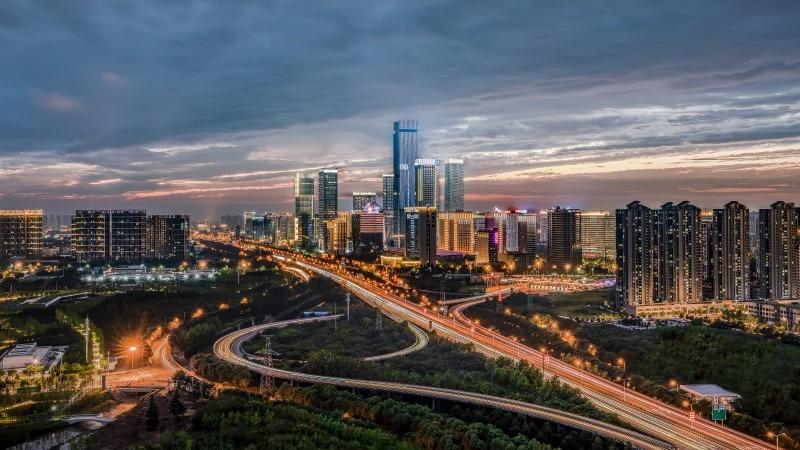 A glance at the High-tech Zone of Xi'an, capital city of Northwest China's Shaanxi province. (PHOTO / VCG)
A glance at the High-tech Zone of Xi'an, capital city of Northwest China's Shaanxi province. (PHOTO / VCG)
Common prosperity is not egalitarianism nor does it mean robbing the rich to pay the poor. Instead, common prosperity means affluence shared by everyone both in material and cultural terms. The goal of common prosperity should be achieved through market economy, so the principles including the market's decisive role in resources allocation, fair play among enterprises, and income distribution according to production factors should be followed up.
To achieve common prosperity, China should adhere to the people-centered development philosophy, pursue high-quality development, eliminate all practices that jeopardize fair distribution of wealth-including abuse of power, embezzlement and other forms of corruption-and provide better public services and social security for the people. Common prosperity can also narrow the wealth gap in society through redistribution of wealth and thus better support vulnerable groups.
The pursuit of common prosperity does not mean a return to the planned economy either. Competition, a characteristic feature of market economy, which prompts individuals and companies to use creative and innovative ways to get a larger share of the market. But market competition is not a typical survival-of-the-fittest phenomenon in which winners take all and the disadvantaged are abandoned.
In China, the income gap has been widening and inequitable distribution of wealth increasing for certain reasons. To begin with, during economic reforms, the factor market is underdeveloped and monopolies dominate some sectors, hindering fair competition and equitable distribution of wealth.
So administrative reform should be accelerated to further improve governance, as well as to strengthen law enforcement and tighten supervision of power, in order to prevent corruption. Studies show corruption and wide income gaps can be attributed to inadequate marketization.
Besides, despite boosting efficiency, the market, without proper laws and regulations, cannot help narrow the widening gap between the rich and the poor. That's why developed countries have established mechanisms for wealth redistribution, social security and public services, mainly influenced by socialist ideas.
These mechanisms have significantly narrowed the income gap, and ensured social stability and sustainable growth in the developed economies. And because of this, the developed economies, except for the United States (whose Gini coefficient is about 0.4), have kept their Gini coefficient at 0.25-0.36, much lower than that of developing countries.
China has made some progress in narrowing the income gap and promoting fairer distribution, but there is still a huge development gap between China's urban and rural areas, and between different regions and industries. In fact, China's Gini coefficient of 0.46 places it among the top 20 percent countries with the widest income gap.
According to the National Bureau of Statistics, in 2020, urban residents' per capita income was about 2.6 times that of rural residents, and in terms of per capita GDP of provinces, autonomous regions and municipalities, the highest was about 4.6 times that of the lowest. Also, in 2019, the average salary of non-private sector employees in urban areas was nearly 1.7 times that of their private sector counterparts, and the average income in the top-ranking industry was 4.1 times that of the one ranked lowest.
Although some of the problems, including the big wealth gap between urban and rural areas, can be solved gradually through development, others have to be addressed by intensifying reforms.
China has been expanding its social security system at an increasing rate to help improve the living standards of middle- and low-income people, but the system still doesn't cover a large number of migrant workers in cities. For example, at the end 2019, about 230 million people were yet to get urban hukou (household registration) and thus deprived of the social security and public service benefits.
There is also a need to improve the tax system and make the fiscal transfer system more efficient to help narrow the income gap between urban and rural areas, and between different regions and income groups.
Without solving the above problems, it is impossible to more equitably distribute the fruits of China's economic development among the people and lead the country toward modernization. And to solve these problems, it is necessary to carry out further reforms to ensure the market plays the decisive role in resource allocation.
So there is a need to improve the business environment, promote fair competition, create equal opportunities for all, and break up monopolies. Land reform, too, needs to be expedited to help form a unified market of urban and rural areas and keep land and housing prices in check.
It is also necessary to further improve governance, strengthen supervision of power, and crack down on corruption and other illegal activities including closing all channels which the corrupt use to make illegal money.
Moreover, governments at all levels should focus on providing better healthcare, education and housing, and other public services for the people, especially for the disadvantaged group. As for governments at different levels, they should ease the hukou regulations so that 230 million migrant workers can enjoy the social security and other welfare benefits.
It is also necessary to improve the tax and fiscal transfer system, as it can help the government provide better public services such as healthcare and education for the people and facilitate equitable income redistribution.
The author is deputy director of the National Economic Research Institute.
The views don't necessarily represent those of China Daily.



